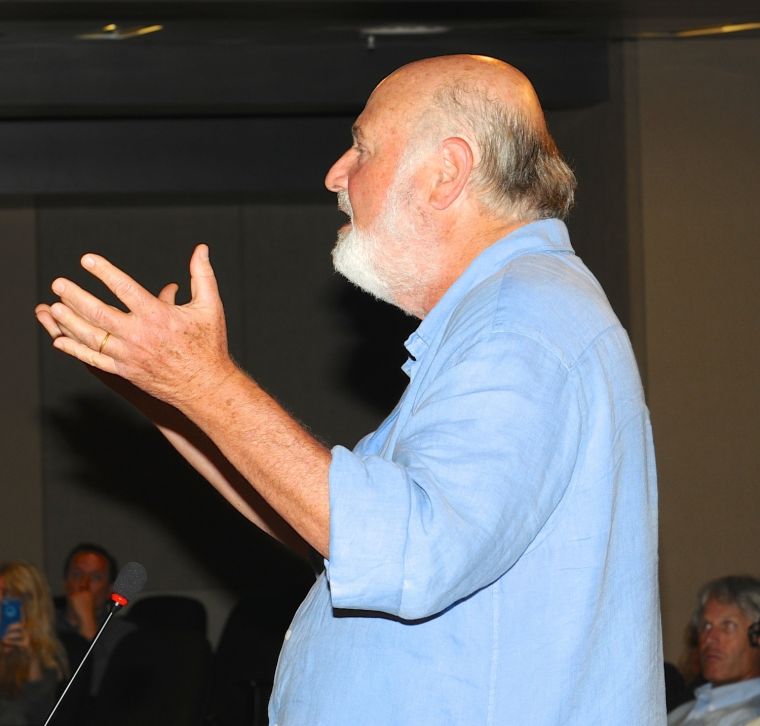This story has been revised. See editor’s note below.
Tempers flared on both sides of the podium Monday night as the Malibu City Council voted 4-1 to place a controversial formula retail initiative, known locally as the Reiner Initiative, on the November ballot, in a marathon meeting that featured legal wrangling, shouting matches, impassioned public comment and lengthy Council remarks.
Later, the Council unanimously voted 5-0 to enact its own similar formula retail ordinance, instead of withholding the decision until after voters go to the polls to decide on the Reiner proposal.
But passing an ordinance in the same vein on the same night was not an attempt to overshadow the other proposal or confuse voters, according to city leaders.
“I don’t … want to wait another four months to have something, because I think it’s important,” said Councilwoman Laura Rosenthal.
Although Monday’s meeting lasted close to five hours, there was hardly a dull moment, as nearly 30 residents and local stakeholders took the opportunity to voice opinions on either side of the debate.
Council members pulled no punches in attacking the so-called Reiner Initiative, which some of them see as a back-door deal without legal support.
“It didn’t go through a long public process. Basically it took a shortcut through Rob Reiner’s living room,” said La Monte, adding, “They found a well-meaning, deep-pocketed celebrity to finance it and I’m sure they’re all really appreciative.”
Reiner, the local activist who donated money and starpower toward the initiative petition, fired back at La Monte from the audience.
“Wow! That’s not what happened, man,” he said.
Eventually, Mayor Pro Tem John Sibert, who was presiding over the meeting while Mayor Skylar Peak attended via Skype, called for both men to stand down.
“This is not the place to have a shouting match,” said Sibert.
City Attorney Christi Hogin described for nearly an hour the legality and precedent for the initiative in state and local government and said she had no legal qualms with the proposed ordinance.
The initiative, for which 2,300 local signatures were gathered, would place a 30 percent limit on the number of chain stores permitted to operate in Malibu shopping centers. It would also require a citywide vote on major shopping center development and commercial or mixed use construction over 20,000 square feet.
“[The initiative] does not in any way attempt to deviate from the basic premise of the land use provision that was set … in the general plan,” said Hogin.
She added some of her own reflections on what the new ordinance could mean to the city.
“I’ve heard people say that this town will never vote yes on a development project. I don’t think that’s true. If people adopt this, they will be assuming the responsibility of doing just that,” said Hogin.
Despite assurances that the initiative is legally sound, some public commenters and council members seemed to doubt the new ordinance would stand up if faced with lawsuits.
“It seems to me like this is a legal minefield,” said La Monte.
Comments against the initiative also came from stakeholders like real estate agent Paul Grisanti, who described the initiative as a “dog’s breakfast.”
Public comment in favor of the initiative took a more somber note, with John Evans, owner of the soon-to-be-shuttered Diesel bookstore, giving moving testimony to what he sees as the plight of small businesses in Malibu.
“Real estate agents and developers threatened the City with lawsuits to stop any restrictions on their profiteering, under the flag of freedom of the markets,” said Evans. “Anyone that believes there is anything related to the free market in this discussion is either silly or self-serving, and usually the latter.”
“The popular sense of necessity for this is so widespread in Malibu,” said Evans, citing the speed at which signatures were gathered for the petition. He added, “It’s been far too long already.”
Reiner seemed to agree, stating that the Council’s only decision would be whether or not to place the initiative on the ballot.
“You can see there’s a lot of passion on each side of this, but you are not here to debate the initiative,” said Reiner, adding, “It’s not a question of if, it’s a question of when.”
The dissenting vote came from Councilwoman Joan House, who cited concerns over “equality under the law” as her primary motivation for her own vote.
“If commercial property owners had submitted an initiative and omitted the date for the election and asked the Council to dismiss the code and put the commercial property owners initiative on a special election, how would this community respond?” asked House.
Reiner has pledged to provide the $18,000 in funding necessary to have the initiative appear on the ballot in November, after seeking assurances from Hogin that doing so would be legal.
The initiative will appear on the ballot for the national election scheduled on Nov. 4.
Editor’s note: This story previously stated that Reiner had pledged $42,000 for the initiative to appear on the ballot. The correct figure is $18,000.




